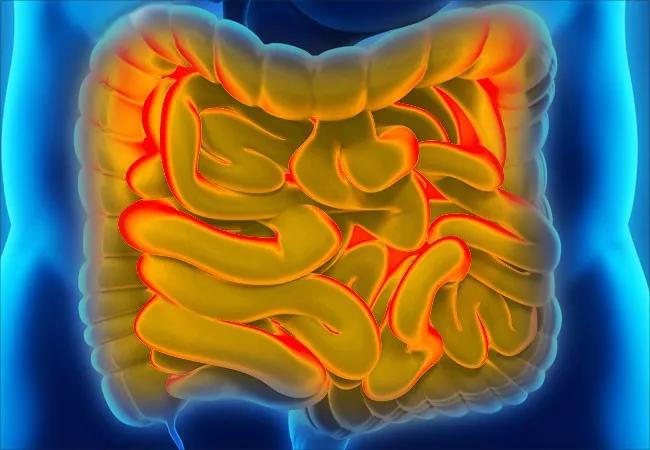Study further validates the role of biologics in improving outcomes

A study of all patients treated for Crohn’s disease (CD) at Cleveland Clinic between 2000 and 2017 found that rates of abdominal surgery for CD were significantly lower in patients who received biologics for six months or more, compared with those treated for less than six months.
Advertisement
Cleveland Clinic is a non-profit academic medical center. Advertising on our site helps support our mission. We do not endorse non-Cleveland Clinic products or services. Policy
The average duration of disease for the entire cohort was 13 years. Use of biologics was significantly higher among patients with pediatric-onset CD than adult-onset CD. In this data set, 60.9% of pediatric patients and 43.5% of adult patients receiving biologic therapy for 6 months or more did not require abdominal surgery.
“Starting from the time biologics were first approved, there have been conflicting data on how much difference they are making. These findings indicate that biologics improve outcomes on a grand scale,” says Cleveland Clinic pediatric gastroenterologist Jacob Kurowski, MD, first author of the study published online in Inflammatory Bowel Diseases.
To conduct this study, Dr. Kurowski and colleagues mined Cleveland Clinic electronic medical records (EMR) for pediatric and adult patients with at least one ICD-9/10 diagnosis code for CD made between January 2000 and September 2017. Of the 30,835 records identified, 700 patients were randomly selected for a chart review. This process revealed that only 47.5% of the adult patients and 51.7% of the children had a confirmed diagnosis of CD.
Natural language processing (NLP) was then performed using specific terms that refer to CD in medical histories, physician notes, endoscopy reports, operative reports, pathology reports and imaging reports. The information was factored into an accurate model of disease prediction. When the model was applied to the 30,835 patients who also had two or more outpatient visits during a single year, a final cohort of 2,060 patients diagnosed with CD prior to age 18 and 4,973 patients diagnosed at age 18 or older was obtained.
Advertisement
“All pediatric and adult patients seen here since 2000 are integrated into our EMR, so we have data from patients who were diagnosed as children and transitioned into adult care,” says Dr. Kurowski. “The data are being continually updated. We stopped the analysis at 2017 for this study, but as of today, we have data on hundreds more patients, many with a disease duration of more than 20 years.”
This study is the largest single-center cohort of CD patients from North America and the first to compare pediatric to adult surgery rates in patients with CD. It is also the first report comparing pediatric to adult rates of biologic use at a single center.
“Overall, our surgery rates were comparable to rates documented in other studies. However, when biologics were used, surgical rates were significantly lower,” says Dr. Kurowski.
It should be noted that biologics did not change the rate of surgery in the year following a diagnosis. However, this does not imply that medications failed these patients. “It means that at the time of diagnosis their disease had progressed to the point beyond what medications can treat, and they needed surgery,” he says.
Additionally, the reasons for less biologic use in adult patients should not be misinterpreted. “Adult gastroenterologists know the benefits. The barriers to using biologics in adult patients are multifactorial,” he says.
On the other hand, the reasons for prescribing biologics to pediatric CD patients are compelling.
“Patients diagnosed with CD under age 30 are at high risk for a heavy disease burden and disease progression. The mean age of diagnosis for pediatric-onset CD in our study was 13.5, so all these patients are at high risk and face a lifetime of disease,” says Dr. Kurowski.
Advertisement
A serious complication of CD is suboptimal growth, which can be overcome with biologics.
Use of medical therapy as a first-line treatment also is more appealing to pediatric patients and their families, who are more likely than adults to be surgery-adverse.
What pediatric CD patients can expect as they transition into adulthood is only one issue Dr. Kurowski hopes to answer as the database grows over time. His list of questions to explore currently spans 14 pages.
“We aim to better describe the natural history of this complicated disease,” he says. “We need better predictors to improve first-line therapies and long-term outcomes. We’d like to know more about the side effects and adverse events associated with long-term use of biologics.
“When new treatments are developed, we will be able to issue early reports on what the first few years look like, compare therapies and parse out different patient phenotypes,” he adds.
When asked for the most important message learned from this current study, he’s quick to answer, “Have a low threshold for referring patients with inflammatory bowel disease (IBD) to a gastroenterologist who deals primarily with IBD. At this point, biologics may be used as first-line therapy and prevent surgery.”
Advertisement
Advertisement

One pediatric urologist’s quest to improve the status quo

Overcoming barriers to implementing clinical trials

Interim results of RUBY study also indicate improved physical function and quality of life

Innovative hardware and AI algorithms aim to detect cardiovascular decline sooner

The benefits of this emerging surgical technology

Integrated care model reduces length of stay, improves outpatient pain management

A closer look at the impact on procedures and patient outcomes

Experts advise thorough assessment of right ventricle and reinforcement of tricuspid valve